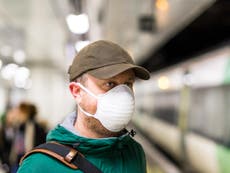Businesses, take note – coronavirus is worsened by the same systems that caused the climate crisis
Covid-19 can teach us vital lessons about this emergency, namely how to accelerate responses to an issue that too many wrongly assume can be kicked into the long grass
We’re not aware of the systems we rely on in our daily lives until something happens to disrupt them.
Food systems remain hidden until it’s difficult to find eggs in the supermarket. Energy systems go unnoticed until there is a blackout. Similarly, Covid-19 has exposed the fragility of the many interconnected systems we take for granted. That’s how what began as a public health emergency has morphed into an economic and social crisis.
Given the many epidemic shocks of the past two decades – Sars, swine flu and Ebola, to name a few – our initial complacency and lack of preparedness for Covid-19 was striking. It highlights our tendency to rise admirably to a crisis while ignoring the very conditions that would prevent the next one, a bit like treating a fever without addressing the underlying disease that’s causing it. We treat the symptoms but ignore the systems.
While this crisis has turned our lives upside down, it has also provided an opportunity to challenge the assumptions underpinning the systems we have created. Some features, like the interdependence created by globalisation, are sources of both value and vulnerability. Others, like inequality, are widespread and pernicious. Individuals, communities and businesses around the world are responding to Covid-19 with urgency, compassion, and creativity. Now is the time to make these changes stick so that we can fight an enemy far more insidious than the coronavirus – the climate crisis.
Covid-19 and the climate emergency are very different problems, one of the starkest contrasts being immediacy. In the early days of the lockdown, a widely shared meme proclaimed: “climate needs Covid-19’s publicist.” But in truth, it’s not about communicating the problem. It’s about the nature of the problem itself. The climate crisis cannot be experienced by people in the same way. When the consequences are felt, they tend to be distributed around the world in acute shocks, like the Australian wildfires. Although we know that these consequences will become more widespread and more extreme, the real emergency is too far into the future to affect our decisions today.
That’s where Covid-19 has done the climate emergency an enormous favour. We now have a global opportunity created by the pandemic to rebuild our economies in ways that could positively affect generations to come. Time has been compressed. There are increasing calls for governments to invest in “green” recovery packages. While such measures would create an essential foundation, debt-saddled governments will face enormous pressure to respond to immediate over long-term needs. Businesses will need to step up and innovate in ways that enable systems to change so that we don’t just recover but rebuild in ways that are sustainable and resilient.
Three features of the business responses to Covid-19 provide critical insights for ways to accelerate the response to the climate crisis: people, place and partnership.
First, people. Businesses have shown in response to Covid-19 that focusing on people’s needs enables innovative solutions. From 3D printing companies making PPE, to breweries making hand sanitiser and food delivery services and others changing their business models to serve the elderly and the vulnerable, the Covid-19 crisis has revealed how a focus on people can accelerate shifts and open new paths for redeploying existing capabilities.
Businesses across industries are developing ambitious plans to reduce carbon emissions, with many recent commitments to net-zero. From energy companies to consumer goods and fashion, now is the time to translate and accelerate these commitments by connecting them to people’s needs. That means stepping back and thinking about the purpose of individual businesses as well as the systems they are a part of. People do not need energy per se, they need the services provided by energy for heat, light and mobility. Reframing with a focus on future needs can unlock ways to connect people and planet.
Second, place. In the blink of an eye, the Covid-19 crisis has made where we are in the world paradoxically both more and less important than it was before. More important in the sense that over half the global population is in lockdown, magnifying our immediate local settings and making us more conscious of the businesses that are likely to suffer close to home. And less important in the sense that many businesses have quickly shifted to virtual working, teaching and events.
Both of these developments show us pathways to respond to the climate crisis. Connecting more with place is a means for businesses to foster bottom-up innovation that responds to local environmental and social needs. This is already happening through city initiatives, like the Amsterdam doughnut initiative, that brings businesses and communities together to co-create sustainable post-Covid systems. At the same time, maintaining some of the Covid-fuelled transition from physical to virtual working patterns will reduce our dependence on air travel, expand access to conferences and allow more flexibility in people’s lives.
Third, partnership. We are witnessing unprecedented global scientific cooperation among pharmaceutical companies, universities and government laboratories in the race to develop vaccines and treatments for Covid-19. We are also seeing unlikely collaborations: garment manufacturers, governments and hospitals working together in Ethiopia to produce PPE, supermarkets collaborating to share data on stock levels and to look after vulnerable customers in the UK. In the latter case, competition rules were relaxed by government to enable innovation.
These are the types of collaborations we need to see in response to the climate crisis. Cross-sector partnerships can fuel speed and scale, while industry-wide collaboration de-risks innovation. But as we have seen with Covid-19, such partnerships require clarity on a common goal and adaptation of rules to enable systemic change.
Speaking to Oxford MBA students last week, Al Gore, the former US vice president, said that “we are in the midst of a sustainability revolution that will have the magnitude of the industrial revolution and the speed of the digital revolution.” A focus on people, place and partnership will ensure that this revolution takes us towards a future that is better for all.
Aoife Brophy Haney is lecturer in Innovation and Enterprise at the Smith School of Enterprise and the Environment and Saïd Business School, University of Oxford. Peter Drobac is the director of the Skoll Centre for Social Entrepreneurship at Saïd Business School, University of Oxford and host of the Reimagine podcast





Join our commenting forum
Join thought-provoking conversations, follow other Independent readers and see their replies